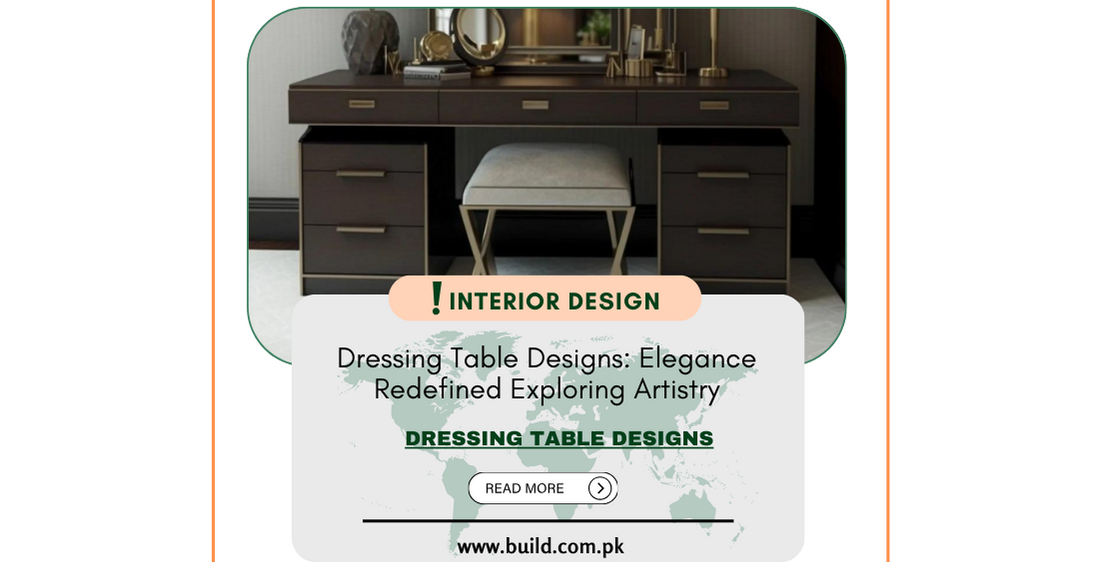Dressing Table Designs: Elegance Redefined Exploring Artistry

Introduction:
The dressing table, an embodiment of sophistication and
functionality, stands as an iconic piece of furniture, adorning bedrooms with
its timeless charm. Beyond its utilitarian purpose, a well-designed dressing
table serves as a sanctuary for personal grooming, a reflection of individual
style, and a centerpiece of bedroom aesthetics.
Historical Significance:
The roots of dressing tables trace back through centuries,
evolving from elaborate vanities adorned with ornate details in aristocratic
settings to contemporary designs that blend functionality with minimalist
elegance. The historical evolution showcases its significance as a symbol of
luxury and personal care.
Understanding Dressing Table Designs
Function Harmony:
Dressing tables balance aesthetics with functionality. They
feature a mirror, storage compartments, and a flat surface for grooming
essentials, ensuring both visual appeal and practical utility.
Styles and Materials:
Designs range from classic vintage styles with intricate
carvings to modern minimalist designs with sleek lines and minimalist features.
Materials vary from wood, glass, metal, to combinations that suit diverse decor
preferences.
Customization and Personalization:
Contemporary dressing tables offer customization options,
allowing individuals to tailor designs to fit their space and needs. Custom
finishes, drawer configurations, and mirror sizes add a personalized touch to
the piece.
Functionality and Space:
Some designs integrate multifunctional elements like foldable
mirrors or convertible surfaces, catering to smaller spaces while optimizing
functionality.

Advantages of Dressing Table Designs
Organization and Storage:
Dressing tables offer tailored storage solutions, including
drawers, shelves, and compartments, facilitating organized storage of grooming
essentials, jewelry, and accessories. This promotes a clutter-free environment,
ensuring items are easily a ccessible.
Aesthetic and Focal Point:
A well-designed dressing table serves as a focal point in
bedroom décor. Its elegant presence adds sophistication, elevating the overall
aesthetics while contributing to the room's ambiance and style.
Grooming Sanctuary:
The dedicated space with a mirror provides a personal
grooming sanctuary, offering a serene corner for self-care routines. It fosters
a sense of privacy and comfort while engaging in grooming rituals.
Design and Functionality:
Modern dressing table designs feature versatile elements such
as adjustable mirrors, foldable surfaces, and lighting options. This
flexibility allows customization to suit individual needs and preferences.
Drawbacks of Dressing Table Designs
Space in Smaller Rooms:
In smaller bedrooms, dressing tables might occupy
considerable space, potentially making the room feel cramped. Oversized or
elaborate designs could hinder mobility or disrupt the room's layout.
Cleaning Requirements:
Elaborate designs with intricate details may require
additional maintenance and cleaning efforts. Dust and debris can accumulate in
decorative elements, demanding regular upkeep.
Personal Preferences:
The suitability of a dressing table heavily relies on
personal preferences and needs. A design that appeals aesthetically might not
always align with functional requirements, leading to a compromise between
style and utility.
Market Availability of Dressing Table Designs
Retail and Furniture Stores:
Dressing tables are widely available in furniture stores,
both brick-and-mortar and online retailers. These stores offer an extensive
range of designs, catering to various styles, materials, and price points.
Specialty Boutiques:
Specialty boutiques and artisanal furniture makers provide
unique and custom-desig ned dressing tables, appealing to individuals seeking
exclusive or personalized pieces that align with specific tastes and room
dimensions.
Conclusion:
The dressing table, an epitome of style and functionality, transcends time and trends, making its mark as a quintessential piece of bedroom furniture. From its historical opulence to its modern-day adaptability, dressing table designs embody elegance, versatility, and practicality, making them an indispensable part of bedroom décor. Whether it's a vintage-inspired vanity or a contemporary minimalist piece, the artistry of dressing table designs continues to redefine personal spaces, blending sophistication with purposeful design.









